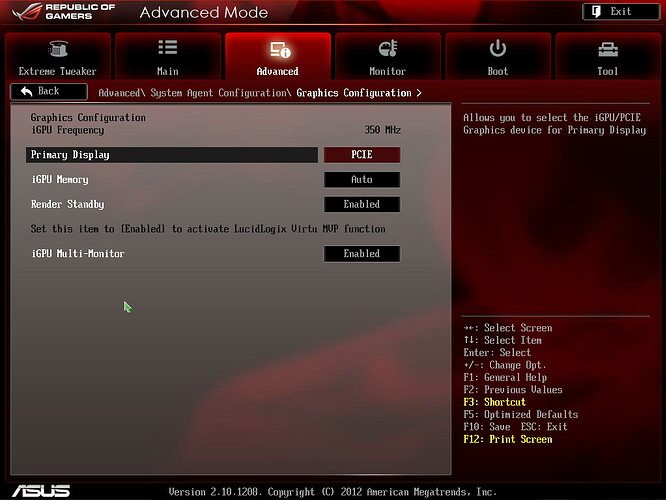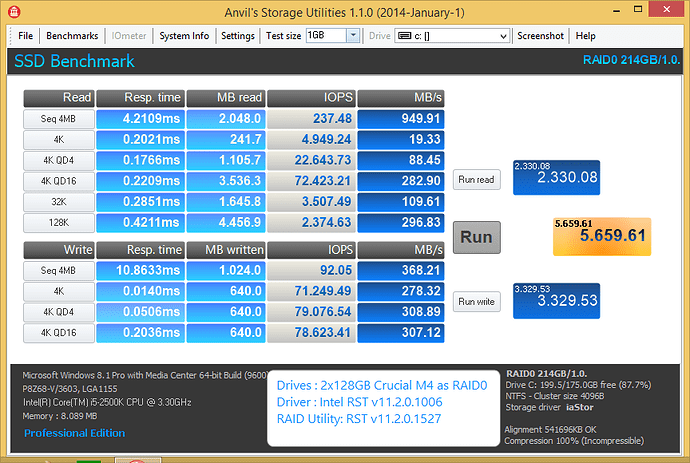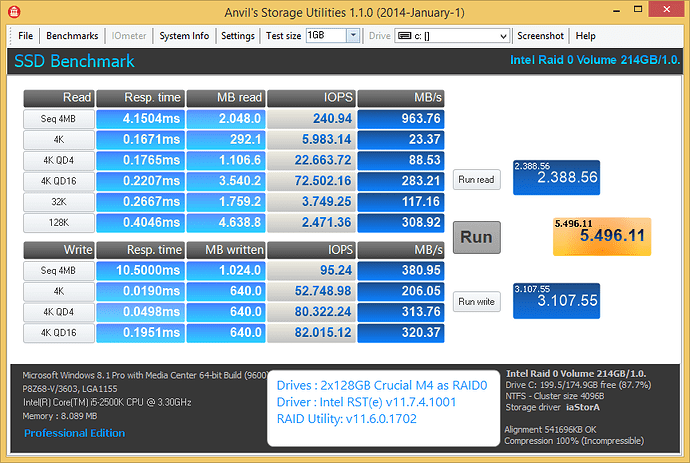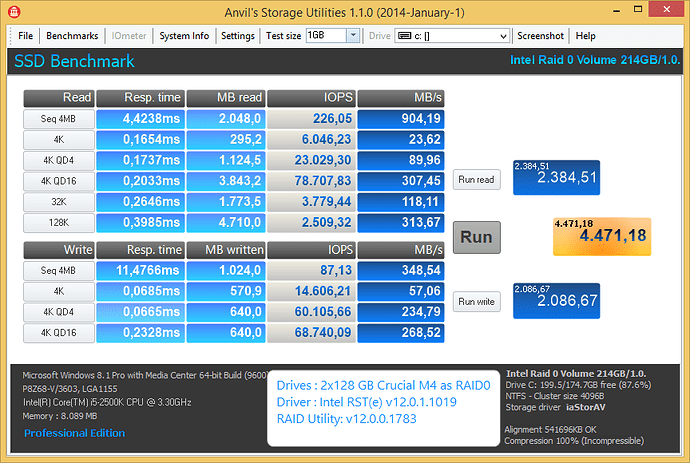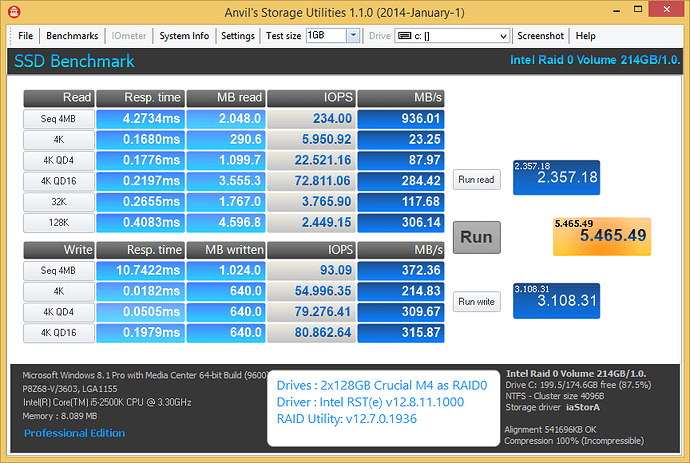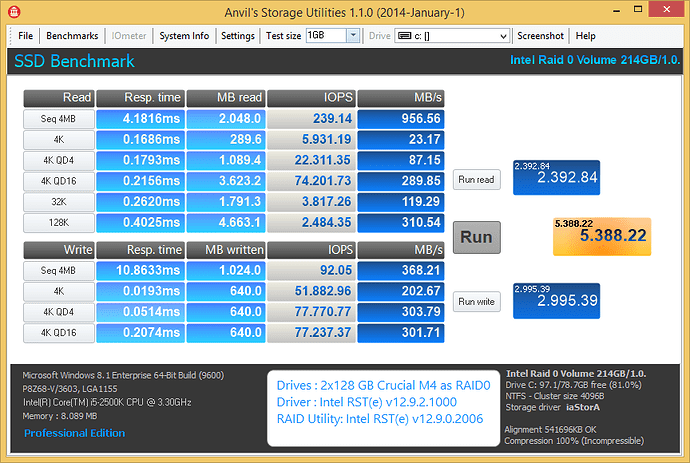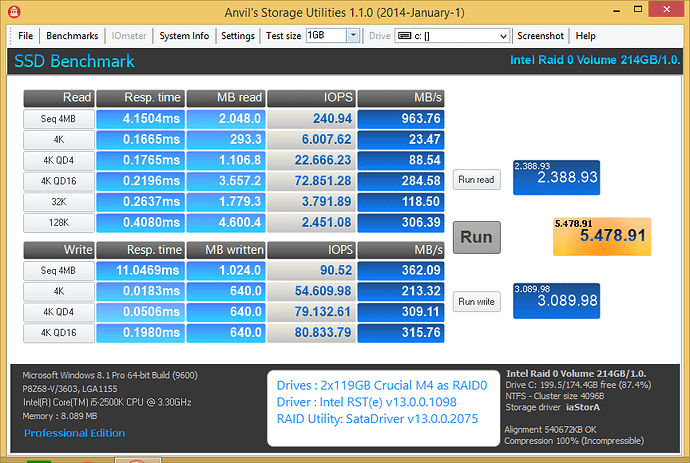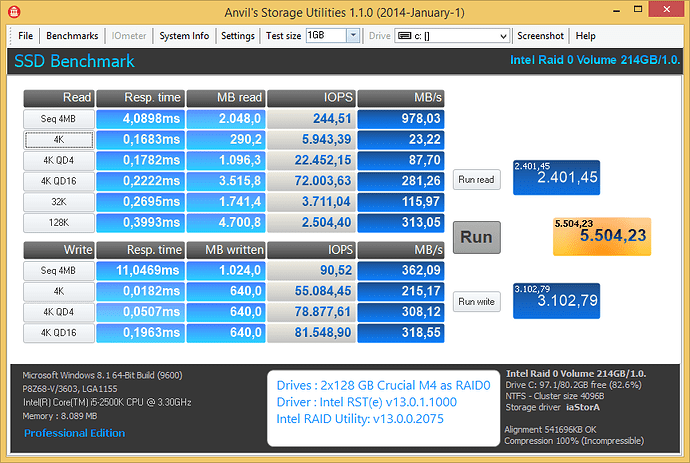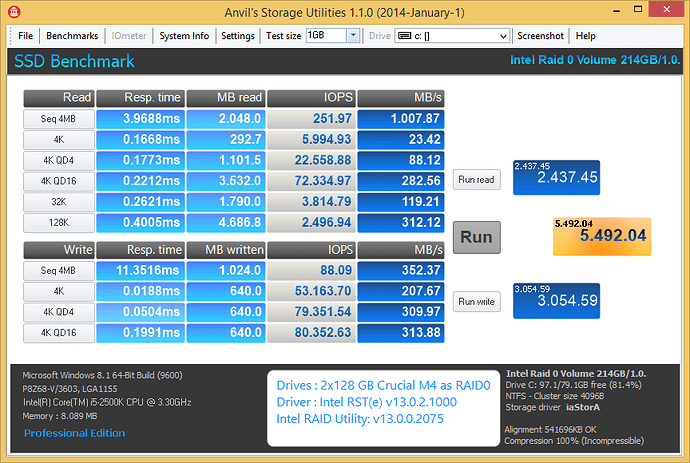But probably the iGPU has different amount or RAM given to it (ie. fixed, automatic, and how much…).
EDIT by Fernando: Unneeded quoting deleted (to save space and Forum performance)
On my "15828 MB RAM" , i have no IGPU active and no iGPU driver installed as i use only one eVGA Nvidia 670 graphic card.
EDIT by Fernando: Quoted text shortened and formatting corrected
Ok, then the iGPU cannot be the reason why you have less available RAM than me. It would explain everything, if it would be vice versa.
Ok, then the iGPU cannot be the reason why you have less available RAM than me. It would explain everything, if it would be vice versa.
(It may be a stupid question, so do not think I doubt you knowledge
[[File:1 (10).jpg|none|auto]]
You certainly mean 100PIER and not me, because I am sure, that my iGPU is enabled and working.
MDM:
These are my BIOS (2104) settings in Advanced\System Agent Configuration\Graphics Configuration:
iGPU Frequency: N/A
Primary Display: PCIE
iGPU Memory: Auto
Render Standby: Disabled
iGPU Multi-Monitor: Disabled
EDIT by Fernando: Unneeded quoting deleted (to save space and Forum performance)
Fernando,
It is very strange that when using Intel RST(e) Driver v13.0.0.1072 beta instead of V12.8.11.1000 I got a Memory size: 16324 MB !! on my PC
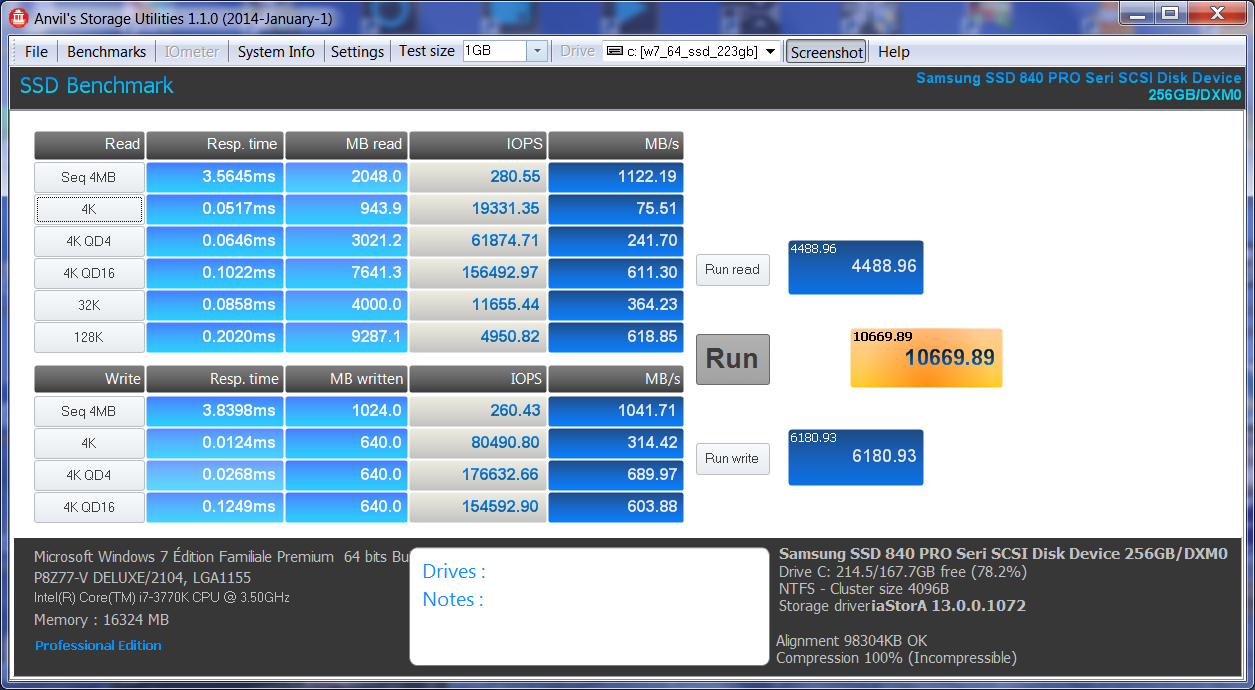
Your memory is a mystery! OR the RST(e) Driver eats it! ![]()
EDIT by Fernando: Unneeded quoting deleted (to save space and Forum performance)
Last weekend I have done a fresh install of the final “Win8.1 x64 Spring Update” in EFI mode onto my Z68 RAID0 system (2x128GB Crucial M4).
I took the opportunity to do some benchmark comparison tests using the following Intel RAID driver/ROM combos:
- Intel RST RAID driver v11.2.0.1006 (dated 05/30/2012, latest Intel RST driver) in combination with Intel RAID ROM v11.2.0.1527
- Intel RST(e) RAID driver v11.7.4.1001 WHQL (dated 03/05/2013) in combination with Intel RAID ROM v11.6.0.1702
- Intel RST(e) RAID driver v12.8.11.1000 WHQL (dated 12/18/2013 in combination with Intel RAID ROM v12.7.0.1936)
- Intel RST(e) RAID driver v12.9.0.1001 WHQL (dated 10/28/2013) in combination with Intel RAID ROM v12.9.0.2030
- Intel RST(e) RAID driver v13.0.0.1098 WHQL (dated 02/26/2014) in combination with Intel RAID ROM v13.0.0.2075
You can find the results within the start post of this thread (>LINK<).
@ all visitors of this thread:
Since >this< thread had already gotten a big volume, I decided to split it and to create a new thread with the title “Performance of the Intel AHCI and RAID drivers”. The opener of this new thread formerly had been the 2nd post of the linked one. Additionally I have moved all performance and benchmark related posts of the old thread into this one. So no post has been deleted, but some are not at the same place anymore. I hope, that everything will be ok for you.
If I should have done a mistake or forgotten to move some posts, please let me know it.
Update of the start post
After having done some new RAID0 benchmark tests with my Z68 system last weekend, I decided to do a fresh install of the Win8.1 x64 “Spring Update Edition” onto my Z77 AHCI system as well.
So the opportunity arised to compare the newest Intel AHCI drivers running my new 512 GB Samsung 840 PRO in AHCI mode.
These were the AHCI drivers I have tested:
- Win8.1 in-box MS Standard AHCI driver (name: storahci.sys dated 08/22/2013)
- Intel RST driver v11.2.0.1006 WHQL (dated 05/30/2012, last “conventional” Intel RST Series AHCI driver)
- Intel RST(e) driver v11.7.4.1001 WHQL (dated 03/05/2013, latest RST(e) AHCI driver of the v11 series)
- Intel RST(e) driver v12.8.11.1000 WHQL (dated 12/18/2013, newest RST(e) AHCI drivers of the v12 series)
- Intel RST(e) driver v12.9.0.1001 WHQL (dated 10/28/2013, latest RST(e) AHCI driver of the v12 series)
- Intel RST(e) driver v13.0.0.1098 WHQL (dated 02/26/2014, actually newest Intel AHCI driver)
You can find the benchmark results and my rating within the start post of this thread.
Note:
For the new performance comparison of the AHCI and RAID drivers I have chosen Anvil’s Storage Utlity and not the previously used AS_SSD benchmark tool. The simple reason is, that the informations delivered by Anvil’s tool are more comprehensive and reliable.
Regards
Fernando
Hello Fernando,
thanks for your new benchmarks!
But i have one question: which Intel UEFI RAID "SataDriver" modules did you use?
@ sandok:
Welcome at Win-RAID Forum!
During my RAID0 performance tests the inserted "TRIM modded" SataDriver modules had the same version as the "Universally TRIM modded" Intel RAID ROM modules (exception: Since there is no SataDriver v11.2 available, I couldn’t insert a matching EFI RAID module.).
By the way: The SataDriver module versions didn’t matter even while running the SSDs in RAID mode, because I forced the BIOS to use the LEGACY RAID OROM.
Regards
Fernando
Here are the benchmark results I got after having installed this new Intel RST(e) driver v12.9.2.1000 WHQL onto my Z77 system (MB: ASUS P8Z77-V, OS: Win8.1 x64 "Spring Update Edition", freshly installed)
A. 512 GB Samsung 840 PRO running in AHCI mode
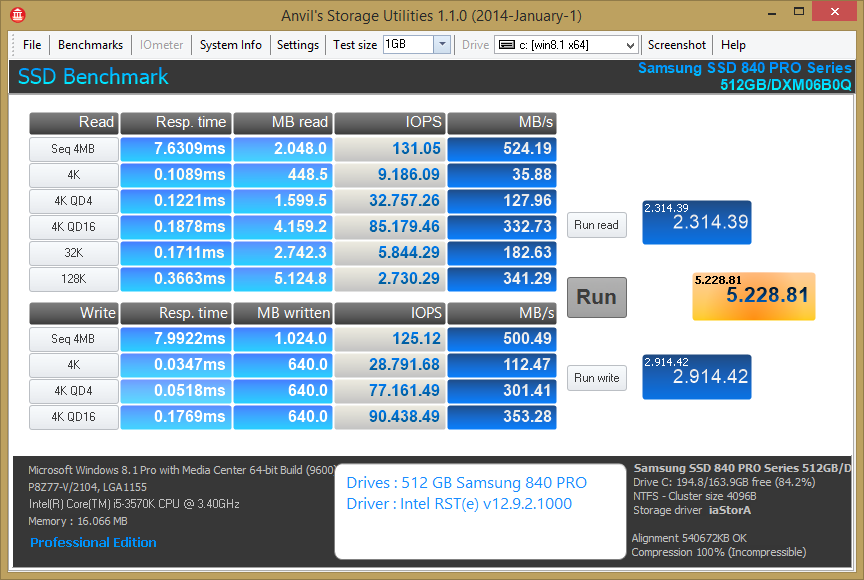
B. 2x256 GB Samsung 840 PRO as RAID0 (with SataDriver v12.9.0.2006)
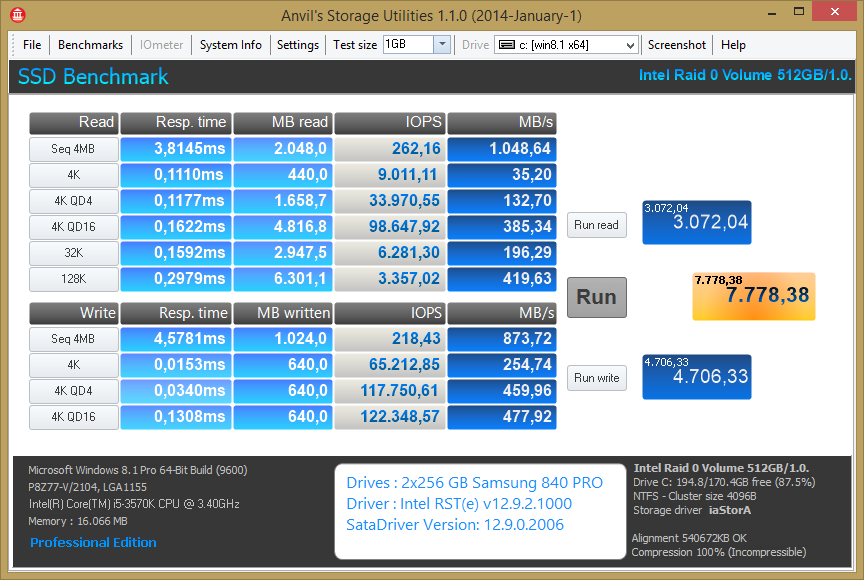
Non-competive benchmark results in RAPID mode:
Here are the nearly unbelievable scores I got with my Z77 system running the Intel RST(e) driver v12.9.0.1000 WHQL in AHCI mode, but after having enabled the Magician RAPID option:
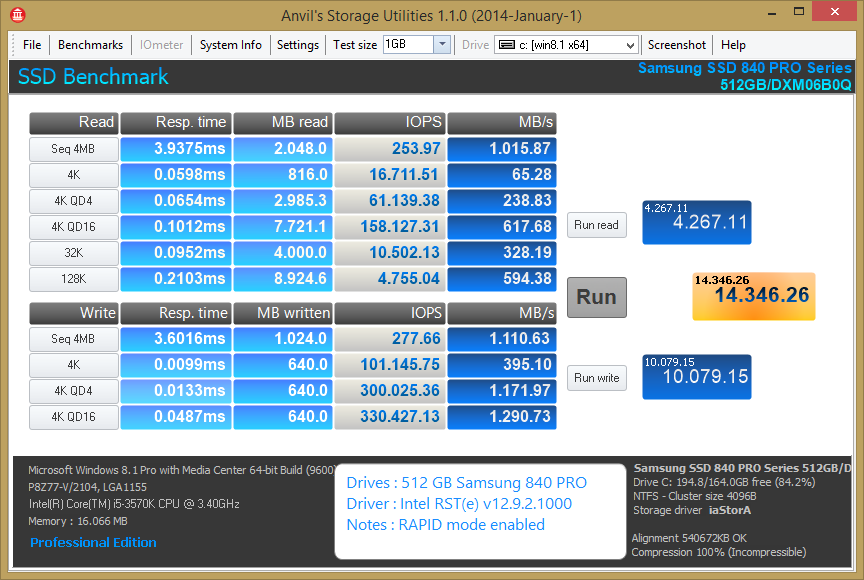
I know this was tested on a Z68 Raid0 based system but thanks for the combination & comparison tests with Raid Drivers/Raid Rom. very handy! The “classical” v11.2 Raid Drivers & ORom remaining the best actually.
PS: If i have well understand it seems that those “Universally Trim Modified” Sata ORom or Sata Raid drivers are not very useful for Z77 Chipset platform or optional ? (i’m using regular ones)
My last RAID0 tests with the Intel RST(e) driver v12.9.2.1000 were done with a Z77 system. If there should be a demand, I will add some results with other Intel RAID drivers and the related SataDriver versions.
Since the actual Intel RAID ROM/SataDriver versions from v11 up natively do support the TRIM in RAID0 feature, Z77 users do not need to insert any "TRIM modified" version.
Ah! ok I have not seen right, the result board benchmark with Z77 Raid0.
Will wait for your results soon, thanks.
That’s what i thought. I wanted to be sure of it!
PS: Found the results with Z77 in Raid0 (page 5, post #74) ![]()
You can see them within the updated start post of this thread.
@ all users with an Intel 6-Series Chipset RAID0 system:
Additionally to the tests with my Z77 system (see the start post of this thread) I have done some additional benchmark comparison tests with my old Z68 system.
Here are the results:
Comparison of different RAID drivers
with an Intel Z68 RAID0 configuration
(all tests done in April 2014)
Test system:
- Chipset: Intel Z68 (mainboard: ASUS P8Z68-V)
Note: The RAID0 test results I got with my Z77 system can be found >here<. - SSDs: 2x128 GB Crucial M4 as RAID0 (stripe size: 128 KB, both SSDs already heavily used, but secure erased before starting the tests)
- OS: Windows 8.1 x64 "Spring Update Edition", freshly installed in UEFI mode (CSM enabled)
Tested Intel RAID drivers:
- Intel RST RAID driver v11.2.0.1006 (name: iaStor.sys dated 05/30/2012, latest Intel RST driver) in combination with Intel RAID ROM v11.2.0.1527
- Intel RST(e) RAID driver v11.7.4.1001 WHQL WHQL (name: iaStorA.sys dated 03/05/2013) in combination with Intel RAID ROM v11.6.0.1702
- Intel RST(e) RAID driver v12.0.1.1019 (Win8.1 in-box Intel RAID driver named iaStorA.sys, dated 08/10/2013) in combination with Intel RAID ROM v12.0.0.1783
- Intel RST(e) RAID driver v12.8.11.1000 WHQL (name: iaStorA.sys dated 12/18/2013 in combination with Intel RAID ROM v12.7.0.1936)
- Intel RST(e) RAID driver v12.9.2.1000 WHQL (name: iaStorA.sys dated 02/26/2014) in combination with Intel RAID ROM v12.9.0.2006
- Intel RST(e) RAID driver v13.0.0.1098 WHQL (name: iaStorA.sys dated 02/26/2014) in combination with Intel RAID ROM v13.0.0.2075
- Intel RST(e) RAID driver v13.0.1.1000 WHQL (name: iaStorA.sys dated 02/26/2014) in combination with Intel RAID ROM v13.0.0.2075
- Intel RST(e) RAID driver v13.0.2.1000 WHQL (name: iaStorA.sys dated 03/26/2014) in combination with Intel RAID ROM v13.0.0.2075
Here are the benchmark results:
- Intel RST v11.2.0.1006 WHQL:
[[File:Anvil-Z68+Crucial-M4-RAID0+Win8.1x64+11201006+11201527.png|none|fullsize]] - Intel RST(e) v11.7.4.1001 WHQL:
[[File:Anvil-Z68+Crucial-M4-RAID0+Win8.1x64+11741001+11601702.png|none|fullsize]] - Intel RST(e) v12.0.1.1019 (default RAID driver):
[[File:Anvil-Z68+Crucial-M4-RAID0+Win8.1x64+12011019+12001783.png|none|fullsize]] - Intel RST(e) v12.8.11.1000 WHQL:
[[File:Anvil-Z68+Crucial-M4-RAID0+Win8.1x64+128111000+12701936.png|none|fullsize]] - Intel RST(e) v12.9.2.1000 WHQL:
[[File:Anvil-Z68+Crucial-M4-RAID0+Win8.1x64+12921000+12902006.png|none|fullsize]] - Intel RST(e) v13.0.0.1098 WHQL:
[[File:Anvil-Z68+Crucial-M4-RAID0+Win8.1x64+13001098+13002075.png|none|fullsize]] - Intel RST(e) v13.0.1.1000 WHQL:
[[File:Anvil-Z68+Crucial-M4-RAID0+Win8.1x64+13011000+13002075.png|none|fullsize]] - Intel RST(e) v13.0.2.1000 WHQL:
[[File:Anvil-Z68-13021000+13002075-RAID0.png|none|fullsize]]
Evaluation of the RAID0 benchmark results:
- As you can verify, my Z68 RAID0 had the best performance (despite the low 4K READ scores) with the "classical" Intel RST driver/OROM combo v11.2.0.1006/v11.2.0.1527.
- The Win8.1 in-box Intel RST(e) RAID driver obviously is the worst choice for users, who want to get a good RAID0 performance. The 4K WRITE scores are horribly bad (despite enabled write-back-caching)
- With the other 5 tested Intel RST(e) driver/ROM combos I got rather similar overall scores. Even the individual READ and WRITE scores were very close together.
You’re the Man! Such time spend for us. 
I’m wondering after those results why Intel have left “classical” development in favor of the New RTS(e). Though the results are quite good also and might satisfied more than one. Very useful charts combination.
I was quite lost in all those Intel oRom & Drivers popping up lately, now i’ve visual benchmarks to help whatever which one i’ll be using.
Looks in both motherboards Z68 & Z77 the IRTS v11.2 and v12.8 perform quite well in Raid0. I’m thinking that i’ll have to upgrade my drives to SSDs in Raid0 instead of my actual
Yes, although the old "classical" Intel RST driver v11.2.0.1006 still gives the Intel RAID0 users the best benchmark results, the RAID0 performance of the actual Intel RST(e) drivers has become much better. The users probably will not realize the difference during their daily work.
The only disadvantage of the Intel RST RAID driver/OROM combo v11.2 is, that I haven’t yet found the appropriate v11.2.0.1527 SataDriver version. As a consequence I have to abdicate the fast booting, when I am using this driver/OROM combo v11.2.
